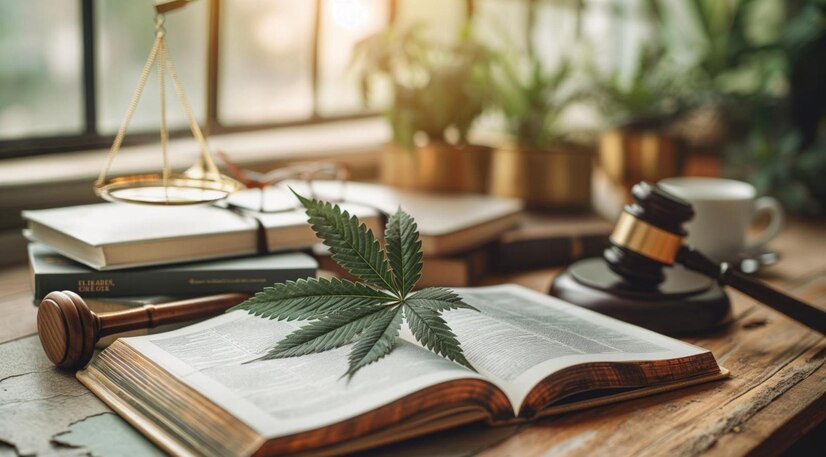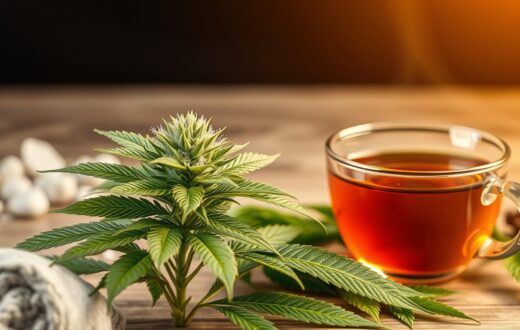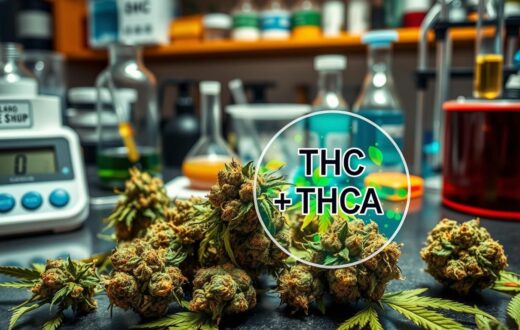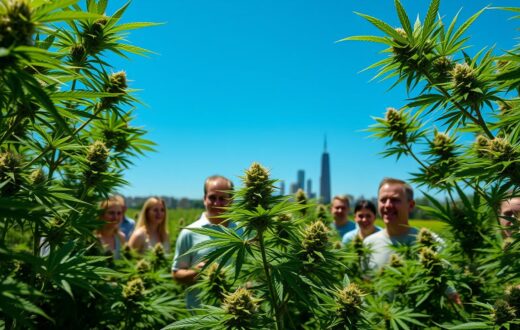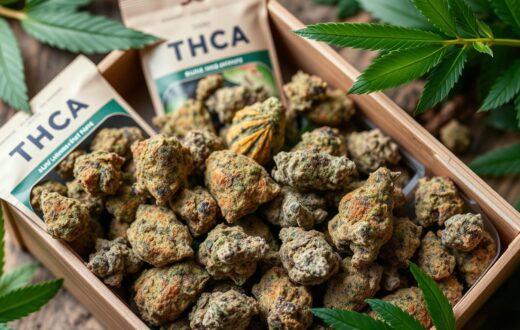Ever wondered why THCA is legal in some states but not others? It’s because of a mix of federal and state laws that have changed a lot lately. As the cannabis world grows, knowing about THCA’s legal status is key for both users and businesses.
THCA is a non-psychoactive part of raw cannabis that’s getting attention for its possible benefits. Its legality depends on THC levels. The 2018 Farm Bill made hemp products with less than 0.3% delta-9 THC legal. This has made THCA products legal in many places, but laws vary a lot.
Now, THCA is legal in most states thanks to federal hemp laws. But seven states – Arkansas, Minnesota, Oregon, Rhode Island, Idaho, New Hampshire, and South Dakota – have stricter rules. This makes it hard for people to understand the laws about marijuana and THCA.
As we dive into the world of THCA legal states, we’ll look at the details of state and federal laws. We’ll also talk about the good and bad sides of THCA. And we’ll guess what the future might hold for this interesting cannabis part. Keep reading to learn more about THCA laws in the U.S.
Introduction to THCA
THCA stands for tetrahydrocannabinolic acid, found in raw cannabis plants. It’s the precursor to THC, the psychoactive part of marijuana. The laws about THCA vary across the United States. It’s important for people to know the rules in their state.
What is THCA?
THCA is a non-psychoactive cannabinoid that turns into THC when heated. This change, called decarboxylation, happens when cannabis is smoked or vaporized. The 2018 Farm Bill made hemp-derived products, including THCA, legal if they have less than 0.3% delta-9 THC. This has opened up a new market for THCA products.
How is THCA Different from THC?
Unlike THC, THCA doesn’t make you feel “high” when it’s raw. This difference is important for understanding the legality of synthetic THCA. Some states allow THCA products if they come from hemp and follow federal THC limits. For example, California and Colorado have rules for THCA products, while Alaska and Hawaii ban THCA over 0.3%.
The Role of THCA in Cannabis
THCA is crucial in the cannabis plant’s biology. It’s thought to have health benefits, but more research is needed. The laws on THCA products vary a lot. Thirteen states, like Arizona, Florida, and New York, let people buy and use THCA freely. But, states like Alabama and Colorado say THCA is illegal if it has more than 0.3%.
Understanding Legality of THCA
The laws about THCA are complex. Federal and state laws often disagree. This makes it hard for people and businesses to understand the rules.
Federal vs. State Law
At the federal level, THCA is okay if it comes from hemp with less than 0.3% delta-9 THC. But, state laws can be stricter. For example, Idaho and Louisiana say THCA is illegal. On the other hand, California, Florida, and Texas allow it.
This difference makes it hard for businesses to sell across states. It also makes it tough for people to buy what they want.
The 2018 Farm Bill and Its Implications
The 2018 Farm Bill changed the rules. It made hemp and hemp products legal at the federal level. This means THCA products can be sold everywhere.
In Texas, over 7,700 stores sell hemp products. But, the bill’s effect on products that get you high is still unclear. We might see more changes in the future.
Schedule I Status of THC
Even though THCA isn’t illegal federally, it’s tricky because it can turn into THC. Some states have laws based on total THC, not just THCA. This makes high-THCA products illegal, even if they’re legal federally.
Delta-9 thc isomer laws also add to the confusion. Some states have rules that go beyond what the federal government says.
Current THCA Legal States
The laws on THCA vary across the United States. Each state has its own rules about THCA, including how much is allowed and where it comes from. This makes it hard for both consumers and businesses to understand the rules.
States with Explicit THCA Legalization
Some states have clear laws about THCA. California, Colorado, and Maine allow THCA but with certain rules. Tennessee is special because it says THCA is legal, just like Delta-9 THC.
These states follow the 2018 Farm Bill. This bill says THCA products with less than 0.3% delta-9 THC are okay.
States Allowing THCA Under Medical Use
In some states, medical marijuana programs let people use THCA products. Missouri, for example, allows THCA products that meet Farm Bill standards for medical use. Ohio has legalized recreational cannabis but has rules for adults 21 and older.
States with Delta-8 THC Regulations
States have different rules for THCA because of new laws. Georgia lets THCA as long as it has less than 0.3% delta-9 THC. New Hampshire’s law is different, allowing any THC cannabinoid other than Delta-9 in hemp products.
THCA’s legal status is always changing. Many states want clearer laws about THCA. It’s important for people to know the local laws about THCA. As the laws change, so will the rules for THCA and other cannabinoids.
THCA Legalization Process
The journey to making THCA legal involves many steps and different methods in each state. As laws about cannabis change, it’s important to understand this process. This is true for both those who use it and businesses in the industry.
Legislative Procedures
State legislatures are key in making THCA laws. They create and pass bills that outline what cannabis compounds are and how they should be regulated. For instance, North Carolina made hemp products, including THCA flower, legal if they have less than 0.3% Delta-9 THC. This rule follows the 2018 Farm Bill, which made hemp and its products legal across the country.
Public Advocacy
Public support is very important in shaping cannabis laws. Advocates teach lawmakers and voters about THCA’s benefits and how it doesn’t get you high when it’s raw. This has helped increase acceptance in places like Raleigh, where you can now buy THCA flower in shops and online.
State-Level Decision Making
Every state has its own way of handling THCA laws. Some look at THC levels, while others consider where it comes from and how it’s made. As laws change, states might adjust their rules. It’s important for users to know their local laws to use THCA products legally.
Cannabis Law Variations Across States
The laws on thc cannabinoids vary a lot from state to state. In the U.S., 25 states have made recreational weed legal. Virginia, Minnesota, and Ohio joined in 2023. Also, 48 states allow some form of medical cannabis use.
This mix of laws makes it hard for users and businesses to navigate.
Comparing THCA Laws to Other Cannabis Laws
Marijuana thc laws are all over the place. Some states fully legalize it, while others ban it. For example, in Alabama and 11 other states, only low-THC CBD oil is legal for non-medical use.
On the other hand, states like California and Colorado have big programs for both recreational and medical use.
Regional Differences in Cannabis Legislation
Cannabis laws differ by region. West Coast states are often more lenient, while Southern states are stricter. For example, Georgia only allows CBD oil with less than 5% THC for certain conditions.
Meanwhile, Connecticut made nearly $5 million in marijuana excise tax in just half a year.
How States Define Cannabis Compounds
States define cannabis compounds differently, making the laws on thc cannabinoids complex. Some states look at total THC, while others focus on delta-9 THC levels. The 2018 Farm Bill set a limit of 0.3% delta-9 THC in hemp.
This has led to a big market for hemp-derived cannabinoids, now worth $28.4 billion.
Potential Health Benefits of THCA
THCA is a non-intoxicating compound found in raw cannabis. It has sparked interest for its potential health benefits. Hemp derived thca regulations vary by state, but THCA is legal in most states if the cannabis contains less than 0.3% of it. This opens up possibilities for exploring its therapeutic uses.
Research on THCA Effects
Studies suggest THCA may have anti-inflammatory, anti-nausea, and neuroprotective properties. It might even help lower proteins linked to Alzheimer’s disease. THCA’s antioxidant properties could protect cells from oxidative stress. These findings are promising, but more human studies are needed to fully understand its effects.
THCA vs. THC: Medical Perspectives
Unlike THC, THCA doesn’t cause a “high” when consumed raw. This makes it appealing for those seeking potential benefits without psychoactive effects. However, when heated, THCA converts to THC, which can lead to side effects like relaxation, memory problems, and anxiety. Thca consumption laws aim to regulate these products, but quality can vary.
User Experiences
Many users report positive experiences with THCA products for managing inflammation, nausea, and other health issues. Some prefer THCA patches or edibles like gummies. But it’s crucial to start with low doses and consult a healthcare professional. Remember, individual responses can vary, and more research is needed to confirm THCA’s full potential.
Risks and Considerations
The world of THCA comes with its own set of challenges. Synthetic thca legality varies by state, making things tricky for consumers. The lack of uniform rules causes confusion for both businesses and users.
Potential Lacking Regulations
Many states still haven’t set clear rules for THCA products. This creates confusion and potential legal issues. The line between legal hemp and illegal marijuana can be blurry, especially with THCA-rich products.
Misinterpretation of Legal Standing
The legal status of THCA is often misunderstood. In its raw form, it’s non-psychoactive. But when heated, it turns into THC, which can exceed legal limits.
Law enforcement tests products to see if they contain THC. This can lead to arrests and charges, even if the product is legal.
Safety Concerns with Unregulated Products
Unregulated THCA products can be unsafe. Without oversight, they might contain harmful substances or have wrong THC levels. The laws against delta-9 THC don’t always cover THCA products, creating a loophole.
Consumers should look for products with third-party lab results. This ensures safety and compliance with federal law.
How to Stay Informed on THCA Laws
Keeping up with THCA laws is vital in today’s fast-changing cannabis world. With new thc analog legislation and policies, it’s crucial to know where to find reliable info.
Resources for Cannabis Legislation Updates
State government websites are great for the latest on THCA laws. Legal databases and industry publications also offer valuable insights. They often give detailed breakdowns of new laws and policy changes.
Following Cannabis Advocacy Groups
Cannabis advocacy groups are key in shaping policies. By following them, you can get early insights into legislative changes. They often update on efforts to reform THCA laws across states.
Tracking Changes in State Laws
To track THCA laws, consider using legislative tracking services. These tools alert you to changes in state laws. Also, monitoring news from state cannabis agencies is effective for staying informed.
Remember, THCA laws differ across states. While some states like Arizona and California allow THCA, others like Wisconsin restrict it. States like Texas and Virginia follow federal rules, allowing THCA from hemp with less than 0.3% delta-9 THC. Knowing these differences is essential for both consumers and businesses in the cannabis industry.
Future of THCA Legislation
The world of cannabis laws is changing fast. THCA legal states are a big topic in cannabis updates. As more places allow cannabis, the future of THCA laws looks bright but also complex.
Trends in Cannabis Law Reform
Recent changes show a move towards more relaxed cannabis laws. In 2021 and 2022, sales of delta-8 THC products hit over $2 billion. This shows people are getting more open to different cannabinoids, not just THC and CBD.
Potential Impact of Federal Changes
Federal changes could change THCA’s legal status across the country. The DEA’s view on THCA in THC tests could impact THCA products. This shows the need for clear rules in all states.
Predictions for Upcoming Legalization Efforts
States are taking different paths with cannabinoid rules. Nebraska’s LB 999 wants to ban CBD with high THC. Florida is looking to limit delta-9 THC in hemp products. South Dakota’s House Bill 1125 aims to ban certain hemp products. These efforts show how cannabis laws are changing and how they might affect THCA’s future.
Conclusion
The legal status of THCA is complex and varies across the United States. The 2018 Farm Bill made hemp products legal. But, state laws on THCA are different, creating a mix of rules.
Key Points on THCA Legalization
Hemp products with less than 0.3% delta-9 THC are legal under federal law. States like California and Colorado allow THCA without restrictions. But, other states only let medical marijuana patients use it.
Responsible Usage
Users need to know the local laws and buy from trusted sources. Businesses must teach customers and follow the rules. It’s important to remember that heating THCA can turn it into THC.
Future of THCA
The future of THCA laws will likely be influenced by cannabis reform. There are talks to change the Farm Bill’s rules on cannabinoids. As we learn more about THCA’s effects, more states might allow it while keeping safety in mind.
Disclaimer
The world of thca legal states and hemp derived thca regulations is complex and always changing. We aim to enlighten you on this topic, but remember, this is for educational purposes only.
Educational Purposes Only
We want to inform you, not give advice. The laws on THCA vary greatly across the United States. For example, 45 states have legalized THCA, but the rules differ.
In Texas, you can buy THCA following federal rules. But in Florida, hemp-derived THCA products are okay, but delta-9 THC is banned outside the medical marijuana program.
Seeking Legal Advice on Cannabis Matters
Because cannabis laws are complex, it’s important to talk to a lawyer for specific advice. Laws can change quickly, and how they’re interpreted can differ.
In Oregon, THCA is restricted because it can turn into THC when heated. And in Rhode Island, it’s banned for the same reason.
Importance of Responsible Consumption
If you’re thinking about using THCA products, use them responsibly. Always check the legal status in your area, buy from trusted sources, and follow the recommended use.
Remember, the age limit for THCA products is between 18 and 21 in the US. Breaking the law can lead to serious consequences. Stay updated, stay safe, and always follow local laws.










